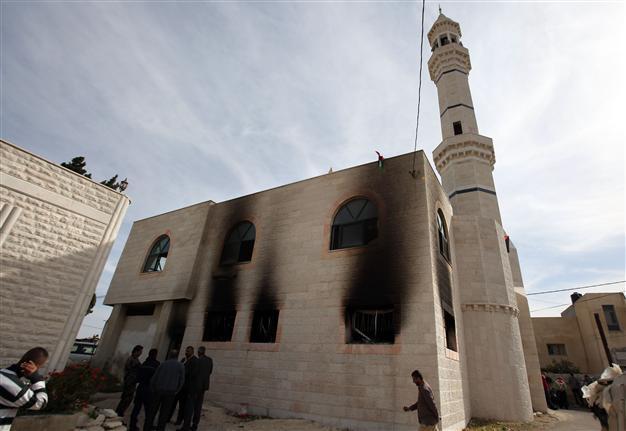West Bank mosque torched in suspected revenge attack
JERUSALEM - Agence France-Presse

Palestinian men stand outside a mosque which was set ablaze by Israeli settlers in al-Mughayer, in the occupied West Bank near the Jewish settlement of Shilo, on Nov. 12. AFP Photo
Suspected extremists torched a West Bank mosque in an apparent revenge attack Nov. 12, as the Palestinian leader and the U.S. top diplomat were to meet Jordan's King Abdullah over the spiralling violence.Months of unrest have escalated in recent days, spreading from annexed east Jerusalem to the occupied West Bank and Arab communities across Israel, and raising fears of a new Palestinian uprising.
With the situation showing no signs of abating, Palestinian president Mahmud Abbas was to hold talks in Amman with the king ahead of a meeting with U.S. Secretary of State John Kerry, officials said.
The meetings were expected to focus particularly on the tensions at Jerusalem's flashpoint Al-Aqsa mosque compound, the third holiest site in Islam where Jordan has custodial rights.
Jordan has expressed mounting concern over Israel's actions at the compound, which is also the holiest place in Judaism. "The situation has become explosive," Nabil Abu Rudeina told AFP.
"The Palestinian position will be made crystal clear: the Israeli violations are a red line and cannot be tolerated - especially with the tension and Israeli escalation in Al-Aqsa and Jerusalem," he said.
The international community has also expressed growing alarm over the deteriorating situation, with U.N. Secretary General Ban Ki-moon demanding that both sides do everything possible "to avoid further exacerbating an already tense environment."
Blair warns about escalation
Middle East Quartet envoy Tony Blair urged both Israeli and Palestinian leaders to "call for restraint and an end to hostile and provocative acts."
But the tit-for-tat violence showed no signs of abating with a pre-dawn arson attack on a mosque in Haughay village between Ramallah and Nablus, which Palestinian security officials blamed on extremist Jewish settlers.
The attack came two days after Palestinian knife attacks killed a settler in the southern Western Bank and an Israeli soldier in Tel Aviv.
Village council head Faraj Nassan told AFP the fire began before dawn. "When we got there, we couldn't even get close because the fire was raging so strongly. We tried to put it out but we couldn't because it was so fierce. By the time the civil defence (firefighters) got there, the ground floor was completely burnt out."
Another mosque in the village was set ablaze by suspected extremists in 2012, officials said. Also overnight, a molotov cocktail was thrown at an ancient synagogue in the Arab Israeli town of Shfaram, causing minor damage, police said. The structure is not currently used for worship.
The mosque attack came as Palestinian anger was already running high after Israeli troops shot dead a 22-year-old protester in the southern West Bank on Nov. 11.
Since the current round of violence began five months ago with the kidnapping and murder of three Israeli teenagers by militants, at least 17 Palestinians have been killed in the West Bank, according to an AFP count.
The violence and simmering religious tension sparked concern both at home and abroad.
"The international community wants to see a complete halt to violence of all kinds, an absolute respect of and adherence to traditional, agreed practices at the holy sites," Blair said.
He also warned Israel against any further expansion of settlement activity, saying: "In the present circumstances, such building can only have the impact of further inflaming an already tense situation."
Israeli Finance Minister Yair Lapid said the situation was "a real test of leadership" for both Abbas and Prime Minister Benjamin Netanyahu.
"We must throw a bucket of cold water over the explosive situation .. of the last few weeks, and not add fuel to the furnace.
"We live in a volatile neighbourhood and responsibility for preserving the security calm is on the shoulders of the leaders, both Jewish and Arab."
Late Nov. 11, Netanyahu said Israel would raze the homes of anyone involved in deadly attacks and would fine the parents of youths caught throwing stones.
Israeli Defense Minister Moshe Yaalon said it was too early to describe the wave of violence as a new Palestinian uprising, but warned the public to be alert for a possible further escalation of unrest. French lawmakers are vote on November 28 on a proposal by the ruling Socialist Party urging the government to recognise Palestine as a state, a parliamentary source said.
The non-binding but highly symbolic vote would follow a similar vote in the British parliament and after Sweden announced it formally recognised the state of Palestine.
















